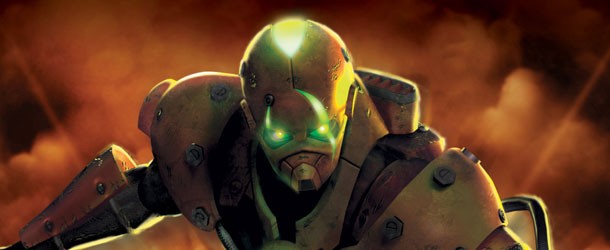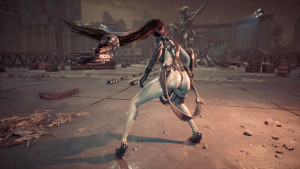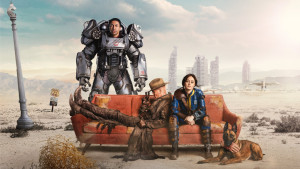Please support Game Informer. Print magazine subscriptions are less than $2 per issue
Deboots: 10 Games That Botched The Franchise Reboot

Reboots are an important part of entertainment media. They offer the opportunity to revitalize a stagnant franchise, often in surprising or interesting ways. Unfortunately, it doesn’t always work.
The word “reboot” can mean many things, but in the world of video games it usually dictates a reimagining, a long overdue sequel, a highly publicized return, or even an attempt to revitalize a series with a return to form. A failed reboot doesn’t automatically translate to a bad game. Some of these games aren’t bad, but they just didn’t generate a revitalized interest the way its creators were hoping.
Tomb Raider: Angel of Darkness
Lara Croft is the queen of reinventing herself, and she has been mostly successful at it. In 2006, Tomb Raider Legend brought Ms. Croft into the current generation with high praise. In 2010, the isometric Lara Croft and the Guardian of Light added a cooperative action element. This year’s Tomb Raider presented an origin story, and it turned out great. Tomb Raider may have never needed multiple reboots to begin with, however, if not for Angel of Darkness.
Angel of Darkness wasn’t an attempt to re-invent Lara Croft, but rather sought to bring her into the PlayStation 2 era alongside a new male character, updated graphics, and strong story. The game was almost universally panned for its terrible controls and combat, and severely injured the franchise for a few years.

Shadowrun
Shadowrun is a series renowned for its storytelling and tactical RPG gameplay, which is why everyone was confused when Microsoft presented its Shadowrun Xbox 360 reboot as a deathmatch-oriented competitive multiplayer shooter. The game has its fans, as it did experiment within the genre in interesting ways with limited flight and magical powers, but it wasn’t the Shadowrun long-time fans wanted. That game came in the form of the Kickstarted Shadowrun Returns.

Perfect Dark Zero
Rare followed up its Nintendo 64 GoldenEye success with Perfect Dark. Everyone loved it, and in response, Rare waited five years to release its sequel, Perfect Dark Zero. The game was meant to be a showcase for the newly released Xbox 360, proving the worth of Microsoft’s considerable investment in Rare and making the Xbox 360 only option if you wanted to play a Perfect Dark shooter.
Ultimately, the game had some novel multiplayer ideas, but it had so many other shortcomings in its level design and shooting mechanics that it ended up being a disappointment. We haven’t heard from Ms. Dark since.

Syndicate
In a situation somewhat similar to Shadowrun, the original Syndicate was a strategy game with an isometric view that tasked players with controlling a group of agents to pull off morally questionable jobs in the name of the corporate overlords.
For its reboot in 2012, Electronic Arts decided to make it a first-person shooter that borrows its premise from the original games, but not much of its strategy. This game stands separately from its source material as a good game, but it failed to generate much renewed interest in the series. Old fans weren’t interested in a game that did not have the strategy of the original, and it failed to reach a significant audience of new fans.

Turok
A large crossover of people exists that likes video games and dinosaurs, but surprisingly, we rarely see the two combined in a meaningful way. Turok made a name for itself on the Nintendo 64 with powerful weapons, impressive graphics, and dinosaurs. He slid into obscurity during the PlayStation 2, Xbox, and GameCube era with the disappointing Turok: Evolution.
The 2008 reboot was simply titled Turok. It shared the name and reptiles of the previous games, but was a reboot in the purest sense in that it was meant to totally reset the franchise. Narratively, it has nothing to do with the previous games. It received a negative critical reception due to its poor AI and shooting mechanics, unfortunately, and players were upset by an achievement that was awarded to backstabbers playing online multiplayer, which was later removed. Turok has been extinct ever since.

Tony Hawk’s Pro Skater HD
Tony Hawk exploded onto the video game scene with a game that for many defined their experience with the PlayStation. With each subsequent release, however, players became less and less interested in the series, with the bizarre Tony Hawk’s Ride placing the final nail in the coffin, forcing the franchise into a coma.
Last year, Activision hoped to revitalize interest from fair-weather fans with Tony Hawk’s Pro Skater HD, returning to the series' roots with some of the most memorable levels from the franchise’s past. Whether it was a product of the game too closely attempting to mirror the original Tony Hawk, or simply not updating itself enough, it just didn’t come out the way we hoped. It’s unclear what the Tony Hawk franchise will do for its next trick.

Splatterhouse
Splatterhouse first reared its bloody head on arcade machines in 1988, coming to home consoles shortly after. Much of its appeal was the absurd level of violence and dark horror-movie inspired themes – something we hadn’t seen in many video games to that point.
In 2010, Namco Bandai tried to reboot the series. As reboot naming law dictates, the title of the game has no references to the previous games , nor does it have a number following the title. The ultraviolent beat ‘em up brought the series into 3D, but gamers had already become desensitized by that point and the new Splatterhouse was largely forgotten shortly after its release.

Bionic Commando
Capcom’s Bionic Commando series commanded a great deal of respect during the NES and arcade age, but with the exception of some Game Boy entries, Capcom never felt the need to do much with the series until 2008.
Capcom pursued a large-scale Bionic Commando reboot, starting with a remake of the original game that released for the Xbox Live Arcade. Bionic Commando: Rearmed was highly regarded and appreciated by fans, but it was only the appetizer for Capcom’s main dish – 2009’s Bionic Commando. This console title was a huge disappointment. A bizarre story, the main character’s horrible dreadlock hairstyle, and a disappointing swinging mechanic which seemed to have potential, but was severely hindered by bad level design, turned everyone away forcing the franchise back into obscurity.

Bomberman: Act Zero
Bomberman is one of those rare mascots that still commands a huge lineage of fans, and even people who don’t generally play games have a good chance of recognizing him. He’s adorable, non-threatening, and most importantly, his games are consistently fun.
Or at least, they were consistently fun until Act Zero released. In one of video game history’s most confusing decisions, Konami decided that Bomberman needed to be a bada** who existed in the future and had giant claws and chains. Bomberman: Act Zero is the polar opposite of the Bomberman we all grew to love, and the franchise has suffered ever since. The confusing art direction took away the game's lively animation and turned it into a lifeless, forgettable brown and black science fiction universe.

Golden Axe: Beast Rider
Much like Sonic the Hedgehog, the Golden Axe series is synonymous with Sega. If you grew up with a Genesis, then there is a good chance you have fond memories of teaming up with a friend to battle fantasy monsters in a side-scrolling fantasy setting.
Golden Axe: Beast Rider took a small mechanic of the original games and stretched it to its breaking point. It also added blood, because no reboot is complete without adding a little bit of additional violence. The game reviewed poorly due to its archaic design, terrible controls, and repetitious combat, causing the franchise to disappear and exist only in its original form on Genesis game compilations.
Are there any deboots that we missed? Are there any that you wished had been successful, opening the floodgates for additional sequels? Let us know in the comments below.










